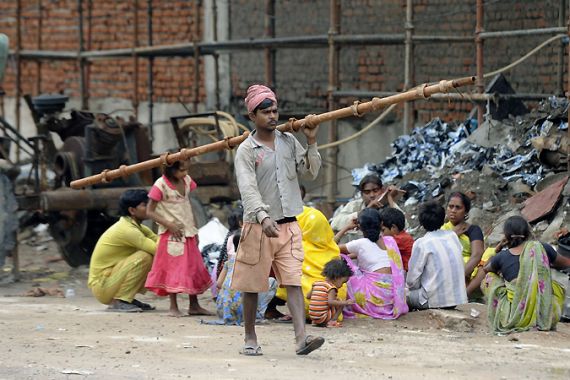India’s ‘time to shine’ jeopardised
Billed as a showcase for India’s newfound wealth, the Games appear to have highlighted the country’s problems instead.

 |
| Migrant labourers have lived and worked in dire conditions constructing the stadium and athletes’ village [AFP] |
The 19th Commonwealth Games was billed as the moment when India would showcase itself on the world stage as an emerging economic power, a nation to be reckoned with.
Their mission statement was: “to develop sport for the benefit of the people”.
However, Divya Gopalan, Al Jazeera’s correspondent reporting from New Delhi, said the Games are seen as solely benefiting the middle classes in India.
“India’s plan was to become more of a developed country, where the poorer classes would be able to move up a notch,” she said. “That hasn’t happened.”
When New Delhi won the right to host the Games, authorities promised to move the city’s slums to make the Indian capital “shine”.
However, the task of rehousing the four million people estimated to live in 860 officially recognised squatter settlements across the city before the Games, due to take place on October 3, proved unrealistic.
Indian authorities forced the resettlement of more than 100,000 of the capital’s slum dwellers in return for a promise of proper housing they have yet to deliver, with residents saying they have been forced into even worse conditions, with few basic services and no jobs.
In June there was a further effort to beautify the city when authorities announced that roadside vegetable sellers, cobblers, and “illegal” vendors selling clothes and food were a “major security risk” and would be evicted before the Games.
All in vain?
However, this week the future of the Games was severely jeopardised by a host of issues, ranging from an incomplete athletes’ village to collapsing infrastructure and withdrawals by several participants citing security and hygiene concerns.
Plagued by accusations of corruption and poor planning ever since it was chosen as host city in November 2003, India is now rife with high tempers. In a poll on Thursday in the Times of India, 97 per cent of the 17,500 people who voted said the Games organisers had tarred India’s image.
“What has happened is that most of the pains of the Games have been taken by the poor,” our correspondent said.
“The labourers have been migrant workers. They have worked under conditions that are unsustainable and have been sent away with very poor wages.
“Once the Games have ended they are going to go back to their villages without jobs and without more work.”
‘Serious repercussions’
Ranjit Abhigyan, from Nasvi, an organisation that campaigns for India’s urban poor, told Al Jazeera that police and government officials have cheated the poor.
| Games at a glance |
|
|
“The government promised to clean up the city and move slum dwellers to proper housing, but that hasn’t happened,” he said.
“They have lost their livelihoods and are socially insecure. The government talks a lot about inclusive planning and growth but its actions have been to push people to the brink [of existence].
“The government talks about national image building but urban poor and squatters don’t matter at all. The Games have turned out to be a big joke in the lives of common people in Delhi.”
Abhigyan said these people are being organised by civil society groups and trade unions to rise up against the injustice done to them.
“The way the urban poor are being dealt with will have serious repercussions on the government after the Games,” he said.
Deadly working conditions
Tariq Adeeb from the Human Rights Law Network, in New Delhi, told Al Jazeera that one in 20 labourers has been killed carrying out construction for the Games.
“There are no safety measures on sites – no boots, helmets, gloves. Only yesterday there was an accident in which 27 workers were injured – one of them critically,” he said.
“There have also been huge violations of minimum wage laws. The difference [in amounts] goes into the pocket of the contractor, it is nothing but corruption.
“We are getting court orders from the high court but the respondents [the government of India] are not complying with them. This is a big issue.”
The rising cost of the Games and allegations of corruption and mismanagement of funds has sparked huge criticism within India. The government says the Games are costing about $2.5bn, almost 18 times more than the official estimate when New Delhi made the initial bid.
Corruption ‘at every level’
A report from India’s Chief Vigilance Commission [CVC] in July pointed to corruption at every level in the organisation of the Games.
It said that almost all organisations executing infrastructure works for Commonwealth Games flouted rules in tenders and increased their prices, and carried out poor quality of construction.
According to the assessment report, large-scale procedural violations, including corruption, were noticed in a total of 14 projects, accusations the organisers deny.
Paul Divakar, from the Housing and Land Rights Network, in India, told Al Jazeera that money meant for welfare programmes in New Delhi was diverted from this year’s budget towards the Games.
“As much as 6,550m rupees [$150m] was released from the budget for construction of the stadiums, roads and other infrastructure,” he said.
“P C Chidambaram [India’s home minister] admitted it last month and promised it would be put back into welfare programmes for Dalits [India’s poorest group] in the state of [New] Delhi.”
His admission stands in stark contradiction to the position of the New Delhi government in July, following the accusations.
“Let me assure you that not a single welfare programme has been compromised,” Sheila Dixit, New Delhi’s chief minister, said.
“So nothing that we have spent is out of the welfare schemes or out of any other fund.”
 It is the 1
It is the 1